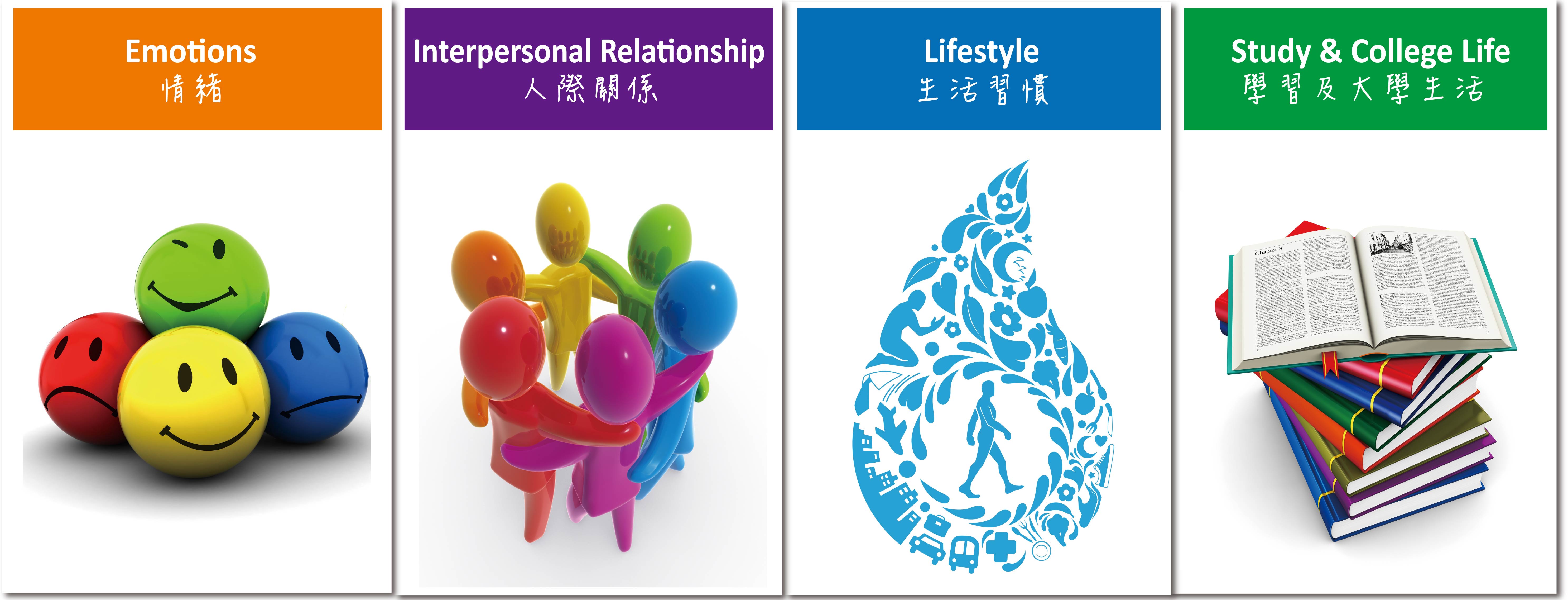Transition & Tips
New Environment
You travel to a new location to study in an unfamiliar environment. There is not only a change of physical environment. It also implies a different academic environment. The class is organised in a different way such as, a bigger class and a variety of learning modes. For sure, the teachers are new to you and they teach in different ways. Social environment in the university is also new to you. Your peers are new, even with different cultures and they interact in different ways. The extra-curricular activities are more diversified. And some of you are even going to stay in a residential hall instead of going home after school.
For Mainland students and international students coming to this new cultural environment, it is not uncommon for you to experience culture shock. This can bring up different kinds of emotions. Some of the normal feelings include mild uneasiness, anxiety and temporary homesickness. Recovery from those feelings takes time and it can take you up to a semester or so. In many cases, students can adopt some coping strategies and recover from culture shock by themselves.
.jpg)
.jpg)
However, if you experience some symptoms such as depressed mood, panic, inability to focus at work, sleep disturbance and change in appetite for more than two weeks, it is advisable for you to seek psychological help as soon as possible.
New Relationships
Who doesn’t want friends? Meeting friends in secondary school was facilitated by the fact that you studied with the same group of classmates every day. In university, however, this can be very different. While your secondary school best friends may not come to this university, you may not go to every class with the same group of classmates. At times, you may find yourself in a lecture theatre with more than 100 people in the same class. Inevitably, it can be quite demanding for you to develop new relationships.
Students who have difficulties in adjusting will commonly experience feelings of loneliness and isolation. While you may be still missing your old friends and want to maintain old relationships, are you also ready to build new relationship with classmates, project-mates, roommates, hall-mates, fellow committee members and university staff, etc.?
Relationships with roommates in particular are a new thing to most students, especially when the roommate has a different upbringing and comes from a different culture. In fact, it is likely that your roommate will have different personal needs and boundaries from yours, such as handling of personal properties, sleep and study habit, personal hygiene, etc. Sometimes, it may be unrealistic to expect your roommate to be your best friend. However, it is totally possible for you to work out with your roommate some mutually satisfying living arrangements. Learn to compromise and respect is also your important developmental task.
University is an excellent place for you to interact with others from diverse cultures and backgrounds. There are many opportunities available for relationship building.
Greater Freedom & Responsibility
In university, most of you don’t have a full study timetable from Monday to Friday. At the same time, it could be the first time you live on your own. This means that you will have a lot more free time and space, and you can exert your independence to make choices and decisions for yourself. However, for some of you, greater freedom implies more uncertainty that can create greater stress.
While you have more freedom in university, you are also expected to fulfill more complex responsibilities on your own, such as balancing your academic and social life, completing assignments on time and being well prepared for examinations, scheduling your extra-curricular activities, managing your finance and taking care of yourself with healthy lifestyle, etc.
None of the above tasks is straightforward and effective self-management is essential to student success.
New Academic Expectations
How much do you know about academic life in university? Academic life in university is very different from studying in secondary school. First, the scope of study can be a lot wider in university. In addition to your major, you can choose elective courses to satisfy your academic interests. You can also take supplementary classes and co-curricular learning such as language courses, art and cultural programmes, etc.
Second, the depth of study can be deeper. While you will also have textbooks and notes as the starting point, you are also expected to pay additional effort to read reference materials and research if you want to have good academic performance. All in all, to do well academically, you must take initiatives in studying. You may also find it helpful to develop effective studying strategies.
Some students experience academic stress due to the demanding academic expectations of the university. Some other students experience stress due to their own high expectation. These can result in high anxiety or even mental illnesses in extreme cases. If you encounter such problems, they should not be overlooked and you should seek assistance from your academic staff and/or a psychological counsellor as soon as possible.
Enhance Your Self-understanding
Whether it is for an academic pursuit, a career or a relationship, the more you understand yourself, the better you will know what fit your personal and academic interests. You may consider having a self exploration through different psychological tests offered either in workshops or online.


There are a number of online psychological tests available for your self-understanding. Among them, you may want to try this College Adjustment Test, if you wonder how well you have been adjusting to your university life.
You may also be interested in the following online psychological tests.
- To understand how much you are satisfied with your life
- To understand your recent stress level
- To understand your reaction to examination stress
On the other hand, if you would like to know more about yourself through advice from a mentor, the Whole Person Development Mentoring will be a good start. Through meeting with an advisor, you will understand better your needs and goals so that you can tailor-made a plan for your university life.
Foster Self-management
For better adjustment, you are encouraged to strengthen your self-management skills such as emotional management and stress management.
A number of Workshops and Seminars are offered throughout the semesters for your personal development.
Or, you may enjoy an elearning since you can learn at your own pace and time by choosing our eCourses. If you want to equip skills on coping with stress, insomnia and procrastination, you can try the following eCourses. Enjoy your learning!
Alternatively, you may talk to a psychological counsellor who is ready to assist you in overcoming daily challenges, promoting your self-management and learning effective time management for your personal and academic development.
Proactively Build Relationship
Apart from your classmates, you may want to make friends with students from other majors or years of study. To facilitate your building of social network, the University provides you with a number of resources:
| i. | A valuable support system Peer Mentor Programme is provided to all freshmen right before you start your first semester. Your peer mentor who may be your first friend on campus really cares about you and is ready to provide support for your university adjustment. Who is your peer mentor? If you haven’t made any contact with your peer mentor, please contact Counselling and Development Centre. |
| ii. | Many of you may choose to run the committee of different student organizations including student union, academic societies or interest clubs. Through organizing different activities for the student organization, friendships are usually deepened. |
In addition, below are some hands-on tips of making friends. Try them out!
| 1. | Be patient and courageous It is natural for everyone to feel a bit uneasy and embarrassed when start develop a new relationship. It takes time to get to know each other. Take the courage to make small steps (smiling, greeting, responding and sharing) and you will gradually find peace in making friends and enjoy the reciprocal interactions. |
| 2. | Be genuine and congruent Cultivate self-awareness of who you are and develop self-acceptance of you own limitations and weaknesses. The more you feel comfortable with yourself, the more you can be true to others. In return, the more others will feel contented to be friends with you. |
| 3. | Be open and respectful Every person is a unique individual with different values and preferences. You may dislike people who insist to change your standards and so do others. Maintain realistic expectations for yourself and others. Be open and respectful to others’ views and needs. You may gain new insights from the human differences. |
| 4. | Be grateful Recognize a smile, kind words or helpful actions that others give you. Appreciate and express a heart-felt thank you to them. Focus on both the gifts you receive and what you give to others can help us to stay connected with one another and develop a satisfying friendship. |
| 5. | Be proactive Seek out places and join activities which you can meet people with similar interests and values, such as interest clubs, service trips, academic/GE classes, student hall, religious activities, etc. Take the initiative to get to know each other and keep contact with those who you feel comfortable with. |
| 6. | Be equipped communication skills Practise makes perfect. Proactively equip yourself with good social skills by observing, listening, learning and practising. You can learn more communication skills by attending our eCourse or you can make an appointment with a Psychological Counsellor for a discussion. |
Promote Cultural Adjustment
Leaving home to study in a new city provides valuable opportunities to learn new things, to explore new places and to meet people with different values and cultural background. To facilitate yourself to cope with the changes and have a better adjustment in Hong Kong, you may find the following tips helpful.
| 1. | Get prepared before you depart Once you have accepted the offer of HKBU, you should start preparing for the life of a new environment. Here are some practical tips to prevent or mitigate homesickness. |
| 2. | Be familiar with available resources Mainland Student Services - A team of our professional and caring staff is ready to provide services and offer programmes to help Mainland students get started with your new life in Hong Kong. In addition, you can join our Host Family Programme which will provide support and care while you are studying in Hong Kong. Counseling Services - Psychological Counsellors are ready to work with you on different developmental issues and emotional distress. In particular, if you find yourself having significant difficulties in maintaining daily functioning while adjusting to a new environment, don’t hesitate and seek counseling service at our Centre. International Office - It provides a variety of academically and socially enriching activities to enhance international and cross-cultural understanding on campus. Language Centre - It designs and delivers a variety of language programmes to help HKBU students improve written and oral English and Chinese (Putonghua and Cantonese) |
| 3. | Share your feelings with others You may think that others are doing well and thus hesitate to share your own feelings. In fact, many Mainland and international students experience similar feelings as you do. Develop a supportive network could allow yourself to feel being understood and equip yourself with resources for coping with homesickness. |
| 4. | Maintain regular contacts with family and friends It is understandable that you wish to maintain regular contact with your own family and friends. Yet, too many contacts and visits (e.g. daily phone calls or getaway trip in weekend) may limit your opportunities to adjust to the new changes and develop new relationships. You can try stay in touch with your family and friends by phone calls or emails, say like once or twice a week. You can also schedule a visit home during long holidays. Allow some space for you to explore and enjoy something new. |
| 5. | Maintain a healthy lifestyle Try to keep up your healthy habits of getting structured and adequate sleep, eating healthy food as well as having enough physical exercises. Although it sounds common to you, you may easily miss these essential “nutrients” given your busy study and activity schedule. Develop a healthy lifestyle is like giving yourself a vaccination so that you can have sufficient energy to cope with the homesickness and new changes. |
| 6. | Be curious and open At the beginning, you may not get used to the customs, habits, and social practices of Hong Kong. To facilitate a better adjustment, having the curiosity to explore, listen and learn will certainly help. Learning Cantonese can be one of the starting point which you can understand about the local culture more easily. You are most welcomed to ask about the local phrases which you don’t understand. Joining interest clubs and making friends with local students can also brighten up your experience in studying abroad. The more you are open to the changes and differences, the more you find joy and peace in your life. |
Sharpen Your Learning Strategy
When you studied in secondary school, you followed a structured learning mode with much guidance and directions given by your teachers. When you study in university, you need to take the initiative and responsibility for enriching your learning experience with comparatively fewer classes and less guidance given by the professors. Here are some basic tasks for helping you to have a good start of your learning journey at HKBU.
| 1. | Know your goals Ask yourself. What are your values and priorities for being a university student? If you have a good understanding of your goals, you can make better planning on how to balance your time on studying, social life and other extra-curricular activities. |
| 2. | Know the requirements Different programmes have different requirements, and so do different universities. Get a clear understanding of the requirements of both HKBU and the programme you study, so that you can plan ahead what courses to take in each semester. |
| 3. | Know your responsibility To do well academically in university, you need to have sufficient self-discipline and be proactive in your studying. Using a daily planner can be helpful to prioritise and schedule your tasks. Also, spare time for preparing the lectures and doing the readings so that you can master the subjects more effectively. With better planning and time management, you can have a satisfying learning experience. |
| 4. | Know your support system You can form self-study groups with your classmates so as to get better insights and support during your learning journey. You can also talk to senior students or peer mentors for learning tips. Do seek advice from your tutors or professors if you encounter difficulties on your study. You can always email them your concerns and arrange a meeting with them. |
| 5. | Know your resources There are plenty of resources available in HKBU, which you can utilize them for enriching your learning. For example, familiarise with the library services for doing better research; familiarise with the University’s facilities for creating a good study environment; explore courses at our Language Centre for improving your English and Chinese; meet your Academic Mentor for seeking advice; or make an appointment with a Psychological Counsellor for learning better study skills. |
| 6. | Learn how to take notes effectively Even though Powerpoint slides are provided for you in most classes, actively taking notes during class can help you focus and better understand main concepts. You can search the internet and find many different strategies for note-taking. Try them and identify the more suitable strategies to adopt. |


